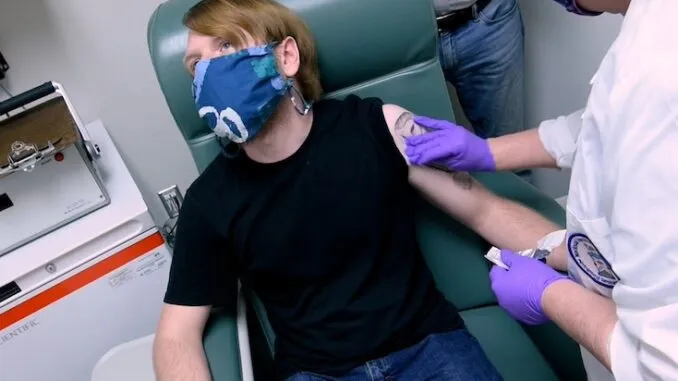by Sean Adl-Tabatabai, The Peoples Voice:
 The widely distributed Pfizer/BioNTech Covid-19 mRNA vaccine causes a rare and deadly form of blood cancer, according to a new study.
The widely distributed Pfizer/BioNTech Covid-19 mRNA vaccine causes a rare and deadly form of blood cancer, according to a new study.
The study raises concerns about the vaccine’s potential to trigger a rare form of blood cancer, known as angioimmunoblastic lymphoma (AITL).
TRUTH LIVES on at https://sgtreport.tv/
The disbursing connection between the Pfizer vaccine and AITL was brought to light by a case study from Marshall University, Huntington, WV, USA. The study reveals that the BNT162b2 vaccine could have played a role in the development of AITL in a patient, due to the malignant transformation of TFH cells in individuals with a predisposing mutation of RHOA-17v.
Trialsitenews.com reports: Does the Pfizer/BioNTech (BNT162b2) mRNA vaccine, while inducing effective stimulation of T follicular helper (TFH) cells which lead to robust germinal center B cell response also trigger side effects including lymphadenopathy? Could this also lead to a rare blood cancer at least in some cases? TrialSite has reported multiple cases of this condition also aggregated in the React19 Scientific Publications Directory, currently housing at least 20 studies showing the mRNA vaccines can on at least rare occasions trigger this condition. And specifically in the present case, the study authors from Marshall University, Huntington, WV, USA report that the Pfizer mRNA COVID-19 vaccine called BNT162b2 appears to have triggered a case of angioimmunoblastic lymphoma (AITL), a rare, peripheral T-cell lymphoma (PTCL) with RHOA-G17v-mutated gene developing in a patient following BNT162B2 vaccine with a plausible explanation. A rare, aggressive, and fast-growing group of blood cancers that affect the lymphatic system, PTCL is a subtype of non-Hodgkin lymphoma (NHL) that develops from mature white blood cells, called T-cells and natural killer (NK) cells, in lymphoid tissues outside of the bone marrow. In the present case, the study authors point to the likely correlation between the diagnosis of AITL following mRNA vaccination due to the malignant transformation of the TFH cells in patients who have a predisposing mutation of RHOA-17v.
The Case Series
Reported in Sage Journals Journal of Investigative Medicine High Impact Case Report, the physician-scientists report that a 60-year-old Asian female received her first dose of Pfizer BNT162B2 mRNA vaccine in August 2021.
Corresponding Author Jai Kumar Khatri, Edward Comprehensive Cancer Center, School of Medicine, Marshall University and colleagues report directly after her vaccination, the patient developed right axillary lymphadenopathy (abnormal lymph node via armpit or axilla). After the second jab in September 2021, she developed lymph node (LN) enlargement in her neck and groin.
The Procedure
The West Virginia physician-investigators report the patient underwent left posterior cervical and left groin LN excisional biopsy in April 2022, due to persistent palpable lymphadenopathy.
“The biopsy results then demonstrated benign follicular hyperplasia,” a benign, non-neoplastic disease that is behind an increase in the number and size of lymph node follicles.
As reported by the Marshall University colleagues, a right axillary LN biopsy was performed for progressive B symptoms. Demonstrating a case of AITL, with molecular studies pointing to a mutation in TET-2, IDH-2, and RHOA-G17v genes.
Progression of AITL following BNT162B2 mRNA vaccine is limited in the literature. However, the Scientific Publications Directory features a handful of comparable studies.
Of note, the study team reported in this case series, “Our case demonstrates a plausible correlation between the diagnosis of AITL following mRNA vaccination due to the malignant transformation of the TFH cells in patients who have a predisposing mutation of RHOA-17v.”
While the authors acknowledge the necessary effectiveness language concerning the mRNA COVID-19 vaccines, they also acknowledge a concern with this linked cancer—and based on the rarity of AITL and the heterogeneity of molecular findings, the authors articulate the need for more studies to further establish any more formal associations.
Read More @ ThePeoplesVoice.tv



